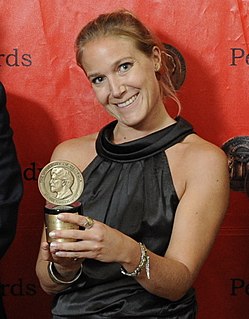A Quote by Thomas Sadoski
Journalism and the questions of journalistic ethics, and why certain stories are put on the air, when, how and for what reasons, are big questions in our culture and society.
Related Quotes
If you don't put the spiritual and religious dimension into our political conversation, you won't be asking the really big and important question. If you don't bring in values and religion, you'll be asking superficial questions. What is life all about? What is our relationship to God? These are the important questions. What is our obligation to one another and community? If we don't ask those questions, the residual questions that we're asking aren't as interesting.
Science is very good at answering the 'how' questions. 'How did the universe evolve to the form that we see?' But it is woefully inadequate in addressing the 'why' questions. 'Why is there a universe at all?' These are the meaning questions, which many people think religion is particularly good at dealing with.
The cool thing about Watchmen is it has this really complicated question that it asks, which is: who polices the police or who governs the government? Who does God pray to? Those are pretty deep questions but also pretty fun questions. Kind of exciting. It tries to subvert the superhero genre by giving you these big questions, moral questions. Why do you think you're on a fun ride? Suddenly you're like how am I supposed to feel about that?
We are shaped by stories from the first moments of life, and even before. Stories tell us who we are, why we are here, and what will become of us. Whenever humans try to make sense of their experience, they create a story, and we use those stories to answer all the big questions of life. The stories come from everywhere--from family, church, school, and the culture at large. They so surround and inhabit us that we often don't recognize that they are stories at all, breathing them in and out as a fish breathes water.
Curiosity is a key building block. The more curious you are, the more creativity you will unleash. A great way to do that is to ask the three "magic questions" again and again... those questions are simply, "Why", "What if?", and "Why not?". Asking these questions constantly focused you on the possibilities and away from how things are at the moment.
As human beings, we all have reasons for our behavior. There may be people who have certain physiological issues that dictate why they make certain choices. On the whole, though, I think we're dictated by our structure, our past, our environment, our culture. So once you understand the patterns that shape a person, how can you not find sympathy?
There are certain realities about the world we live in. Syria and Iraq are just not going to get on air every day. For us as journalists, we're still trying to navigate this world. Journalism is changing. How do we tell our stories - especially with the wars that have continued for so long? How do we keep it relevant?
The great philosophers of the 17th and 18th centuries did not think that epistemological questions floated free of questions about how the mind works. Those philosophers took a stand on all sorts of questions which nowadays we would classify as questions of psychology, and their views about psychological questions shaped their views about epistemology, as well they should have.
have a much harder time writing stories than novels. I need the expansiveness of a novel and the propulsive energy it provides. When I think about scene - and when I teach scene writing - I'm thinking about questions. What questions are raised by a scene? What questions are answered? What questions persist from scene to scene to scene?
At teenage parties he was always wandering into the garden, sitting on a bench in the dark . . . staring up at the constellations and pondering all those big questions about the existence of God and the nature of evil and the mystery of death, questions which seemed more important than anything else in the would until a few years passed and some real questions had been dumped into your lap, like how to earn a living, and why people fell in and out of love, and how long you could carry on smoking and then give up without getting lung cancer.




































